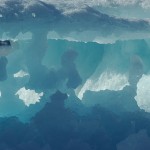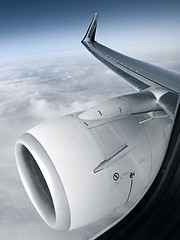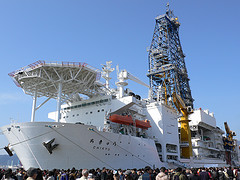June 29th, 2009 by Aleteia Greenwood | No Comments »

UBC Engineering student helps collect scientific data for Canada’s Arctic submission to the United Nations
Alexander Forrest, a UBC civil engineering PhD candidate, is part of a team supporting the use of autonomous underwater vehicles (AUVs) to collect scientific data for Canada’s Arctic submission to the United Nations.
Forrest has been working with International Submarine Engineering Ltd. as a support engineer and will assist in AUV operations next year when two AUVs operate thousands of metres under the ice to survey the seabed.
Canada, the U.S., and Denmark are collecting scientific data to establish sovereign rights to parts of the Arctic Ocean under the United Nations Convention on the Law of the Sea. Canada has until 2013 to provide its submission to the United Nations. Russia and Norway have already made submissions to the UN.
More at UBC This Week.
**image by cam17
Posted in Civil Engineering, General Science, Geography, Main, Uncategorized | No Comments »
June 24th, 2009 by Eugene Barsky | No Comments »
Here is the presentation Kevin Lindstom, Aleteia Greenwood and myself have presented at the second international m-Libraries Conference yesterday (Wed June 23, ’09) in Vancouver, BC
Abstract:
Introduction
While the concept is widely defined and interpreted, all Web 2.0 tools have certain characteristics in common; they are collaborative in nature, interactive, and dynamic. The Science and Engineering librarians at the University of British Columbia are collaborating with their liaison departments to record science and engineering podcasts, host them and share them with a wider audience.
Objectives
In this session, we discuss the use of podcasting as an outreach tool that connects a large academic science and engineering library with its users and raises users’ awareness of additional library services. Functionality, usability and practical applications of podcasting tools are reviewed.
Outcomes
At the end of this session, we will have demonstrated:
1) Overall usability of podcasting academic science and engineering content; tips and tricks when creating and tailoring podcasts to your community needs;
2) Use of podcasting as an outreach and community engagement tool in academic libraries and as a supplement for the traditional academic information resources.
Discussion
The strength of podcasting, to allow content to be created by the users for the users, makes it an appealing addition to the academic librarians’ toolbox. Podcasting is a service that many of our users might not expect from their library, which makes it a unique and attractive offering. It requires few resources, and the end result might exceed librarians’ expectations. We found podcasting to be a robust outreach tool and a service that raises the profile of the library and as such creates an opportunity for users to find additional library resources. Nevertheless, it is necessary for academic librarians to critically evaluate the continuous innovations of Web 2.0 technologies on an ongoing basis so that they are best prepared to put them into the
Here is the presentation in PDF format (100KB) – Portable Science and here it is embedded in the blog’s entry.
We will also add the podcast of this presentation in a few days as well…
Posted in General Science, Main, News, Teaching | No Comments »
June 18th, 2009 by Eugene Barsky | No Comments »

A short article from last month in the New Scientist discussed the changes in quantum computing in the last decade. Another related article from the April’s Science could also be of interest – “Where Is My Quantum Computer?”
See more research about quantum computing in the Web of Science database that UBC subscribes to. Here are 180 articles retrieved for my quick search for “quantum comput*” and secur* (you need a subscription to this database to view the results).
** Photo by All Glass
Posted in General Science, Main, Physics, Uncategorized | No Comments »
June 9th, 2009 by Eugene Barsky | No Comments »

Thomson Reuters has released its latest figures for Canadian Science last week – http://sciencewatch.com/dr/sci/09/may31-09_2/
Between 2004 and 2008, Thomson Reuters indexed 226,232 papers that listed at least one author address in Canada. Of those papers, the highest percentage appeared in journals classified under the heading of environment/ecology, followed by psychiatry/psychology and geosciences. As the right-hand column shows, the citations-per-paper average for environment/ecology papers from Canada-based authors was 24% above the world average in the field (5.49 cites per paper for Canada versus 4.43 cites for the world). In fact, in all the fields shown here, the impact of Canadian research exceeded the world average, with particularly strong performance in space science (44% above the world average), physics (43% above), and agricultural sciences (+29%).
It is great to see that we are producing a decent share of world’s research. But it seems that Engineering is one of weak points!
** Photo by tripleman
Posted in Astronomy, Atmospheric Science, Chemical and Biological Engineering, Chemistry, Civil Engineering, Earth and Ocean Sciences, General Science, Geography, Main, Materials Engineering, Mathematics, Mechanical Engineering, News, Physics, Science - undegraduate classes, Statistics, Wood Sciences | No Comments »
June 3rd, 2009 by Eugene Barsky | No Comments »

There is an excellent article about the attempt to drill down into the Earth’s crust – and even through the crust, using the equipment aboard Chikyu – Japanese research ship.
It is a relly interesting read – “Ocean monster shows hidden depths”
You can see the relevant research for this area in Web of Science and Meteorological & Geoastrophysical Abstracts (MGA) databases that UBC Library subscribes to…
** photo by kayakaya
Posted in Atmospheric Science, Chemical and Biological Engineering, Earth and Ocean Sciences, General Science, Main, Science - undegraduate classes | No Comments »




